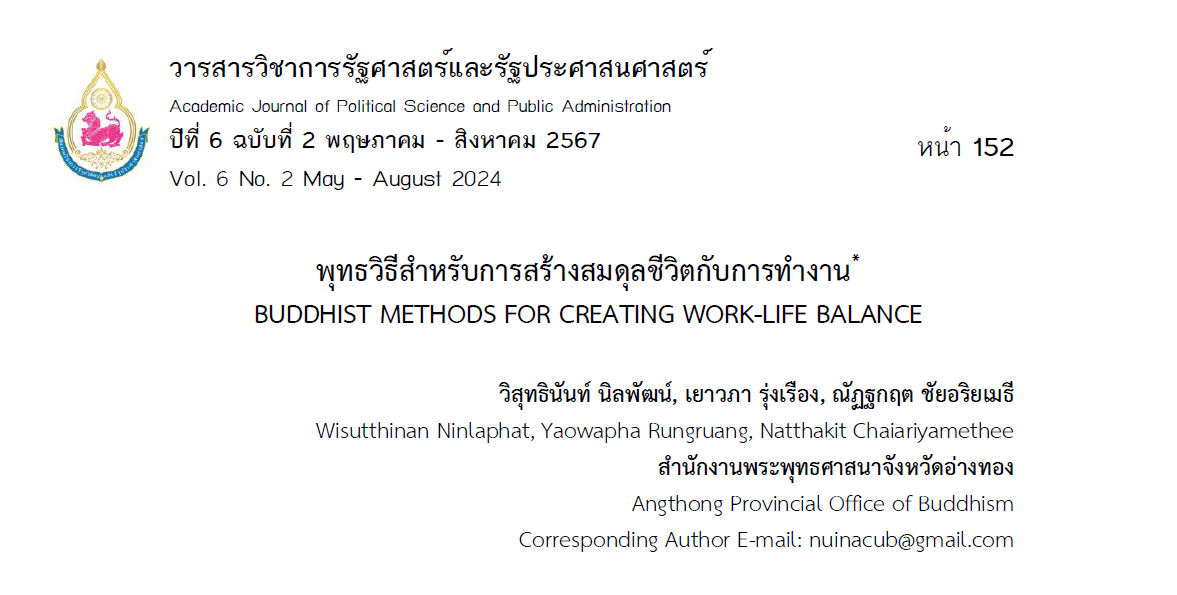พุทธวิธีสำหรับการสร้างสมดุลชีวิตกับการทำงาน
คำสำคัญ:
สมดุลชีวิต, การทำงาน, พุทธวิธีบทคัดย่อ
บทความวิชาการนี้มีวัตถุประสงค์เพื่อศึกษารูปแบบ การปรับเปลี่ยนพฤติกรรมในการจัดการเวลาให้เกิดความเหมาะสมกับการทำงาน โดยอาศัยหลักธรรมทางพระพุทธศาสนา ในการสร้างสมดุลชีวิตตามหลักธรรมในพระพุทธศาสนา เริ่มต้นที่บุคคลต้องสร้างความมีดุลยภาพชีวิตของตนในทุกด้าน โดยแต่ละด้านควรนำหลักไตรสิกขาและธรรมข้ออื่น ๆ ที่เกี่ยวข้องสัมพันธ์กันมาประพฤติปฏิบัติร่วมด้วยเพื่อให้เกิดประสิทธิผลต่อการปฏิบัติมากยิ่งขึ้น เพื่อสร้างสมดุลให้เกิดขึ้นระหว่างการใช้ชีวิต การทำงาน การพักผ่อนให้มีความเหมาะสมต่อบุคคล เพื่อไม่ให้เกิดผลเสียต่อสุขภาพกายและใจ และ การปรับเวลาให้มีความเหมาะสม ด้วยการยอมรับความเปลี่ยนแปลงของเวลาซึ่งเป็นอนิจจตา ความไม่แน่นอนของสถานการณ์ที่ไม่อาจคาดเดาได้ เพื่อให้งานและกิจกรรมสามารถดำเนินได้อย่างต่อเนื่อง ในภาวะเศรษฐกิจในยุคปัจจุบันทุกชีวิตในวัยทำงาน แต่ละคนมุ่งมั่นทำงานเพื่อพัฒนาคุณภาพชีวิตตนเอง ไม่ว่าจะเป็นเพศใดทั้งหญิงและชาย ในประเด็นความสมดุลระหว่างชีวิตการทำงานเพื่อหารายได้เลี้ยงชีพ กับชีวิตด้านอื่น ๆ ของคน ได้รับความสนใจมากขึ้นทั้งในภาครัฐและเอกชนของประเทศต่าง ๆ ทั่วโลก ส่วนหนึ่งเป็นผลมาจากแนวโน้มทางด้านประชากรและสังคมเศรษฐกิจที่เปลี่ยนแปลงไป เช่น การที่ผู้หญิงทำงานนอกบ้านมากขึ้น หรือกำลังแรงงานที่มีอายุเฉลี่ยมากขึ้น (Aging Workforce) แต่ถ้าหากองค์กรต่าง ๆ ต้องการที่จะดึงดูดและรักษาทุนมนุษย์ที่มีความรู้ความสามารถให้อยู่กับองค์กรไปนาน ๆ ก็จำเป็นที่จะต้องจัดการให้บุคลากรมี Work-Life Balance ที่ดี มิฉะนั้นแล้วบุคลากรอาจรู้สึกไม่เป็นสุขกับชีวิต และลาจากองค์กรเพื่อไปแสวงหา ทางเลือกที่ดีกว่าให้กับชีวิตของตน โดยนำหลักพุทธธรรมมาประยุกต์ใช้ในการปรับสมดุลชีวิตให้เหมาะสม
เอกสารอ้างอิง
เกรียงศักดิ์ เจริญวงศ์ศักดิ์. (2545). บริหารเวลาเพื่อความสำเร็จ. กรุงเทพฯ: ซัคเซสมีเดีย.ธวัชชัย พืชผล. (2553). เวลาคือโชค. กรุงเทพฯ: Dดี.
พระพรหมคุณาภรณ์ (ป.อ.ปยุตโต). (2559). พจนานุกรมพุทธศาสตร์ ฉบับประมวลธรรม (พิมพ์ครั้งที่ 34). กรุงเทพฯ: มูลนิธิการศึกษาเพื่อสันติภาพพระธรรมปิฎก.
พัชรี แช่มช้อย. (2560). การบริหารเวลาเชิงพุทธบูรณาการ (ดุษฎีนิพนธ์ศาสนศาสตรดุษฎีบัณฑิต สาขาวิชาพุทธศาสน์ศึกษา). นครปฐม: มหาวิทยาลัยมหามกุฎราชวิทยาลัย.
มหาวิทยาลัยมหาจุฬาลงกรณราชวิทยาลัย. (2539). พระไตรปิฎกฉบับภาษาไทย ฉบับมหาจุฬาลงกรณราชวิทยาลัย. กรุงเทพฯ: โรงพิมพ์มหาจุฬาลงกรณราชวิทยาลัย.
สุรีพร พึ่งพุทธคุณ. (2549). การบริหารจัดการเวลา (Time Management). กรุงเทพฯ: เอ็กซ์เปอร์เน็ท.
สุรีพร พึ่งพุทธคุณ. (2551). ทักษะการบริหารเวลา Managing time. กรุงเทพฯ: เอ็กซเปอร์เน็ท.
Downs, L.J. (2008). Time Management Training. Maryland: Victor Graphics, Inc.

ดาวน์โหลด
เผยแพร่แล้ว
รูปแบบการอ้างอิง
ฉบับ
ประเภทบทความ
หมวดหมู่
สัญญาอนุญาต
ลิขสิทธิ์ (c) 2024 วารสารวิชาการรัฐศาสตร์และรัฐประศาสนศาสตร์

อนุญาตภายใต้เงื่อนไข Creative Commons Attribution-NonCommercial-NoDerivatives 4.0 International License.




